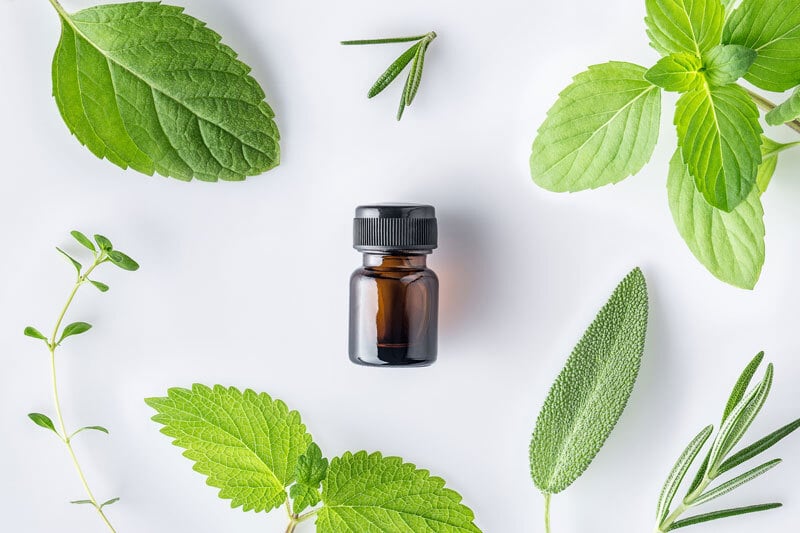Nausea, heartburn, indigestion, upset stomach, diarrhea. This is not an article about Pepto-Bismol, but it is an article about all of those hush-hush issues. Listen, everyone gets a little digestive problems sometimes and running to the store to spend some cash on a pink drink just doesn’t sound all that appealing to most people—especially if those people are interested in naturally treating their digestive issues.
Essential oils are powerful, all-natural plant remedies that offer a wide-variety of benefits and supporting digestion is just one of them. But of course, healthy digestion is at the root of all health and wellness. If you’re not digesting correctly, your immune system can be compromised, your skin can feel the effects, and your whole body will feel, well, like dodo. In this article, you’re going to discover the best essential oils for digestion and how to use them. Get excited, no more pink drink for you!
Today, we’re going to highlight a lot of oils that can be taken internally so your gastrointestinal tract can really benefit. Let’s dive into the top seven essential oils for digestion.
TRUTH BOMB:
You’re
Already killing it!
If You Were More Consistent With Your Wellness Routine, You’d Be Unstoppable.
Top 7 Essential Oils for Digestion
Anise
Main Constituents: trans-Anethole
Anise spice is commonly used to promote and ease digestion. Historically, chewing anise seeds post-dinner was popular to help with digestion-especially after a large feast. Harness anise oil’s digestive properties by mixing a drop or two with raw honey and adding it to a warm mug of water.
To aid digestion, relieve gastrointestinal spasms and gastrointestinal problems, consider topical and internal use of anise oil!
Bergamot
Main Constituents: Limonene, linalyl acetate, linalool, terpinene, β-pinene
While bergamot oil is popularly known to help ease anxiety, it also works to ease digestive issues. Historically, Traditional Chinese Medicine used bergamot fruits and peels to treat indigestion. Because of its ability to calm the mind, it should come as no surprise that bergamot oil can also soothe digestive issues while stimulating the system (1).
Research shows that bergamot oil’s anti-bacterial properties may even be useful when fighting food poisoning (2).
To soothe digestive problems, dilute 1-2 drops of bergamot oil with a ½ teaspoon of coconut oil and massage onto your stomach. Breathe deeply for mind-calming effects.
doTERRA DigestZen
DigestZen is the ultimate combo of essential oils for easy-peasy digestion. Powerful oils include peppermint, coriander, ginger, caraway, cardamom, fennel, and anise—some of the oils we highlight in this article.
When used internally, Digestzen can support digestion, soothe upset stomachs, reduce gas and occasional indigestion. It’s sweet, spicy, and minty aroma is perfect for a big post-dinner massage to help get your gastrointestinal tract on the right tract.
So whether you’re on holiday, vacation, or a big family event (those with foodie families say ‘I’), always make sure to bring DigestZen with you.
This proprietary blend will help maintain a healthy GI tract, aid in digestion, and calm gastric upsets. You’re really getting the most bang for your buck with this genius blend.
To use, mix 2-3 drops with a teaspoon of raw honey and add to warm water. You can also combine a couple of drops with a tiny bit of carrier oil and massage into your stomach. And obviously, you can diffuse this yummy blend for a calming aroma.
Fennel
Main Constituents: trans-Anethole, α-pinene, limonene
Fennel essential oil has a main volatile compound called anethole, which prevents activation of a “gene-altering inflammation-triggering molecule,” meaning that this oil not only works on inflammation but also digestive pain.
As a volatile oil, fennel evaporates quickly, passing off and providing relief sooner than later. This is why fennel essential oils help with gas, constipation, bloating, and even diarrhea.
A lot of times, it can seem like eating vegetables makes you more bloated—in fennel’s case, it is the opposite—and the same goes for fennel essential oil. Fennel oil can clear bowels, relieve constipation, and eliminate issues proving relief. In fact, fennel may even prevent the formation of additional gases! (3,4)
Fennel’s pungent, bitter aromatics are similar to other oils that help with IBS and digestion, like ginger and peppermint.
To use fennel for digestion, add five drops to your diffuser and inhale while cleaning up the dishes, dilute 1-2 drops with a ½ teaspoon of carrier oil and apply to the tummy, mix 1-2 drops with raw honey and add to warm water, or add 1-2 drops in a veggie capsule with a food grade oil and take.
Ginger
Main Constituents: α-zingiberene, beta-sesquiphellandrene
Folk medicine and asian cultures have harnessed gingers’ digestive properties for centuries by adding it to meals to help aid in digestion.
Ginger oil is one of the most common natural remedies for stomach aches, vomiting, indigestion, diarrhea, nausea, and constipation. In 2015, the Journal of Basic and Clinical Physiology and Pharmacology published an animal study that looked at the gastroprotective activity of ginger essential oil in rats. The study found that ethanol-induced lesions, erosion, and hemorrhage of the stomach wall were significantly less after oral administration of the oil.
More research published in Evidence-Based and Complementary and Alternative Medicine found that ginger essential oil effectively reduces nausea and the need for nausea-reducing medications post-surgery. Ginger oil also showed analgesic effects helping relieve pain immediately after surgery.
To use ginger essential oil for digestion, mix 1-2 drops with a teaspoon of honey and add to hot water. You can also dilute 1-2 drops with a carrier oil and apply to the tummy area.
Lemon
Main Constituents: Limonene, β-pinene, γ-terpinene
Drinking warm lemon water in the morning is the key to flushing out liver toxins and stimulating your digestive system. Lemon essential oil, a more potent form of the fruit, can also help with digestion by soothing gastritis and constipation.
Chemical and Biological Interactions published an animal study that showed lemon essential oils reduced the erosion of the stomach lining while also working as a protective agent against stomach lesions.
Another study evaluated the efficacy of lemon, peppermint, and rosemary essential oils on older adults suffering from constipation. The control study found that those in the aromatherapy group, reported a significant reduction in constipation than those in the control group. Those in the experimental group also had a larger number of bowel movements, and the natural constipation relief lasted two weeks after treatment!
To use lemon essential oil to improve digestive flow, combine 1-2 drops with a carrier oil and massage into your stomach. For daily cleansing, mix 1 drop with 1 teaspoon of raw honey and add to warm water.
Peppermint
Main Constituents: menthol, menthone, eucalyptol
Last but not least, this oil is most commonly known for its digestive health benefits.
Peppermint has various benefits when it comes to promoting digestion. For starters, research shows that internal use of peppermint oil effectively treats irritable bowel syndrome (IBS). Using peppermint oil for IBS can help relax intestines, reduce spasms in the colon, and help with gas and bloating.
One randomized clinical trial showed a 50 percent reduction in IBS symptoms in 75percent of the patients who used it! 57 patients either took two peppermint essential oil capsules twice a day for four weeks or a placebo. The experimental group experienced a reduction in abdominal pain, discomfort, constipation, diarrhea, and urgency.
Always consult with a doctor before replacing medication with oils. If you’re interested in trying a natural remedy for IBS, add 1-2 drops of peppermint oil into a veggie capsule with ¼ of a teaspoon of a food grade oil. Take internally before meals. If you’d prefer topical use, mix 2-3 drops with a carrier oil and apply topically to your stomach.
Peppermint oil can also be used for nausea, which sometimes comes with digestive problems. One study showed that patients who inhaled peppermint oil via nasal inhaler after cardiac surgery. The majority of patients reported a decrease in nausea after two minutes of inhaling peppermint.
For nausea, simply inhale peppermint directly from the bottle or diffuse 5-8 drops.
Now that you have a list of the best essential oils for digestion, are you ready to give up Pepto-Bismol? Of course, you can still hum the tune of the song because unfortunately it is catchy. Let me know in the comments below what you think your favorite oil on the list will be!





READ the Latest
Health Habits
Health Habits
Longevity
Longevity